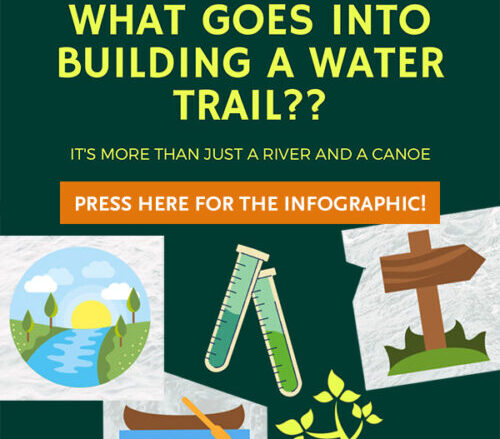Friends of the Rouge is currently working with the ten communities and Wayne County to develop a water trail and a network of connected greenways along the Lower Rouge from Canton to the Detroit River. Water Trail Leadership Committee Meetings are held every other month on the third Thursday. Email me, Herman Jenkins, at hjenkins@therouge.org if interested.

WHAT GOES INTO BUILDING A WATER TRAIL??
It is more than just a river and a canoe.

Access Points
Getting Boats in the Water
Launches are needed at strategic points along the river that are accessible to the community. Too few launches make for long adventures, which makes paddling not fun for a lot of people. Launches need to be designed to accommodate users of all abilities and fit in with the existing features of a park.

Water Quality Monitoring
Ensuring that the Water is Safe
Polluted runoff and combined sewer overflows can make things like harmful bacteria present in the water. This can make the water unsafe for people to be in. Regular monitoring is needed to identify where there might be problems and what can be done.

Signage
Where am I?
Knowing where you are on the river is important to track how far you have gone, help plan your trip and assist responders in finding you if you need assistance. Understanding what features are located near an access point can help you decide where to take a break and get a snack, obtain assistance, or find your way back to where you started.

Woody Debris Management
Riverbank Erosion Causes Trees to Fall
If a tree falls in a forest, no one might hear it, but if a tree falls in a river, it could collect more trees and refuse and make the river impassable and dangerous. Regular management is needed to open logjams in an environmentally-friendly way to not disturb the habitat that wood provides for fish and wildlife.

Safety Plan
What happens in case of an emergency
Partnerships are needed with local communities to help find and rescue someone in case of an emergency. This requires adequate signage on the water so responders can find paddlers, training of first responders, and robust education of paddler personal safety measures.
It takes time, coordination, and investment to build a water trail! Partnerships are needed between different cities, advocacy groups, and community members to create a unified vision. A lot of work is involved in planning, designing, constructing, and maintaining an open and safe river for both canoers, kayakers, and the plants and animals that make the river their home.
For more information on the Lower Rouge River Water Trail and how you can be involved, email me, Herman Jenkins, at hjenkins@therouge.org.

LRRWT Planning-Related Content
| Lower Rouge River Water Trail Strategic Plan |
| Lower Rouge River Water Trail Draft Safety Plan |
| Lower Rouge River Paddling Maps full map | west section map (Canton to Inkster) | middle section map (Inkster to Dearborn) east/south section map (Melvindale to River Rouge) |
| A signage package has also been developed. |
Join the Rouge Paddling Group on

Please Note:
The water is generally safe for boating if there has been no heavy rain or snowmelt; swimming is not recommended.
The Lower Rouge River Water Trail is a consortium of interested groups and communities and is a project of the Lower Rouge River Water Trail Leadership Committee. Contact us through info@therouge.org.